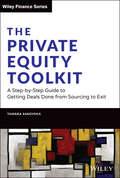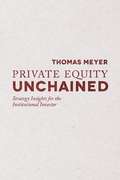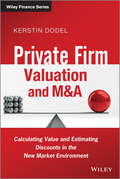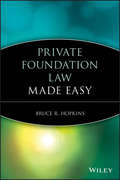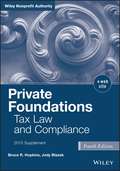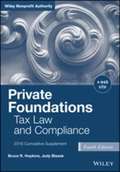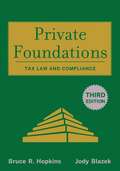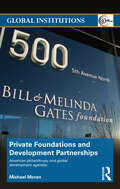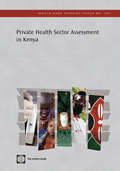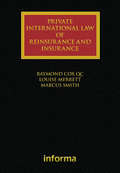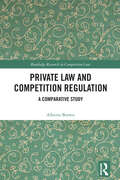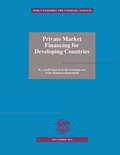- Table View
- List View
The Private Equity Toolkit: A Step-by-Step Guide to Getting Deals Done from Sourcing to Exit (Wiley Finance)
by Tamara SakovskaMaster the navigation of private equity deals from sourcing to exit with this comprehensive guide The Private Equity Toolkit: A Step-by-Step Guide to Getting Deals Done from Sourcing to Exit offers readers the first complete guide to executing a private equity deal from start to finish. Written by an accomplished professional with twenty years of experience in the private equity space, this book is perfect for current private equity analysts and associates, as well as business students and professionals seeking to enter the private equity field. This book covers every stage of the private equity process, from sourcing the deal to company exit. It provides a systematic overview of how to: · Originate attractive investment opportunities; · Generate superior deal insights; · Form effective working relationships with management teams; · Add value on portfolio company boards; and · Achieve profitable investment exits. The Private Equity Toolkit equips its readers with actionable frameworks and proprietary tools that can be applied on a daily basis in the private equity industry. The content found within is designed to be current and helpful for years to come and appeals to a global audience.
Private Equity Unchained: Strategy Insights For The Institutional Investor
by Thomas MeyerThere are significant returns to be made from private equity, infrastructure, real estate and other illiquid investments, but a competitive strategy is essential for investment success and for meeting objectives. This book takes readers through all the considerations of planning and implementing an investment strategy in illiquid investments.
Private Equity Valuation in Emerging Markets
by Paul A. Gompers Timothy Dore Victoria IvashinaThis note provides an opportunity to understand how private equity investors need to adapt to emerging markets.
Private Equity Valuation in Emerging Markets
by Paul A. Gompers Victoria Ivashina Timothy DoreThis note provides an opportunity to understand how private equity investors need to adapt to emerging markets.
Private Firm Valuation and M&A
by Kerstin DodelA comprehensive guide to the changing face of valuation in private firm M&A transactionsBased on the author's extensive professional experience as well as her rigorous academic research, this book describes a more sensible approach to using discounts in private company valuations and provides readers with a deeper appreciation for the need to weigh a much broader range of influences on value in the M&A process. Does the idiosyncrasy of family-owned business influence transaction multiples? What of regional market differences and differing market environments over time? How do you estimate the influence of the subprime on the transaction process? With the help of fascinating case studies drawn from an eclectic array of M&A transactions, including a beauty contest, author Kerstin Dodel answers those and other central questions about the M&A process. Among other things, she vividly demonstrates that the ultimate price paid in such a transaction reflects not only a target company's unique characteristics, but the varying motivations and expectations of each of the participants within the context of a competitive M&A process.Dodel has an extensive background in the profession and her research draws upon rigorous scholarship and her years of working at Credit Suisse First Boston, Deutsche Bank, and other leading global financial institutionsEmphasis is given to the post credit crunch environment, and responding to regulators' increasing rejection of over-simplified procedures for firm valuation
Private Foundation Law Made Easy
by Bruce R. HopkinsNow your foundation can be fully informed about the basic legal requirements affecting private foundations and avoid the perils lurking in nonprofit tax law traps. Private Foundation Law Made Easy clearly shows you how, with information on reaping the charitable and tax advantages of your private foundation. Filled with straightforward guidance, author Bruce Hopkins?a leading authority on the laws regulating private foundations?demystifies this topic for you and your board members with practical legal information in easy-to-understand English.
Private Foundations
by Jody Blazek Bruce R. HopkinsWith more than 50,000 private foundations in the United States and the increasing scrutiny of the IRS, this much-needed, annually updated manual provides you with a wide range of tax rules and regulations for these foundations. Coauthored by a lawyer and tax accountant, the revised and expanded Third Edition includes practical tax compliance suggestions and in-depth legal explanations. Capturing all-new developments in the private foundations arena, the new edition presents you with line-by-line instructions, sample-filled IRS forms, and complete citations.
Private Foundations: Tax Law and Compliance, 2016 Cumulative Supplement
by Bruce R. Hopkins Jody BlazekThe must-have tax law reference for private foundations, updated for 2016 Private Foundations provides an authoritative reference and extensive analysis of tax law and compliance in the private foundations arena, with a wealth of practical tools to streamline applications, filing, and reporting. This 2016 Cumulative Supplement captures the latest regulatory developments for easy reference, with coverage of tax-exempt status, mandatory distribution, annual reporting to the IRS, winding up a foundation's affairs, and much more. Comprehensive line-by-line instructions are included for a variety of exemption applications and tax forms, and easy-to-use checklists highlight areas of critical concern to help you avoid oversights. Sample documents are provided to guide the composition of organizational bylaws and letters of application, and completed IRS forms provide practical reference for side-by-side comparison. With comprehensive, up-to-date coverage of the private foundations space alongside helpful tools and visual reference, this book is a resource every foundation needs. Written by two of the nation's leading authorities on private foundations, this supplement provides essential guidance you can trust. Clear, concise instructions focused on real-world use makes this reference a critical companion for those tasked with the responsibility of maintaining a foundation's tax-exempt status. Learn the latest guidelines for compliance, reporting, and eligibility Access the latest regulatory changes quickly and easily Organize reporting and applications with checklists and sample forms Find valuable tools and reference for all aspects of private foundation compliance Increasing IRS scrutiny makes compliance a more critical issue than ever before. An organization's tax-exempt status is generally vital to its continued operation, and a single oversight can put the future in jeopardy. Private Foundations provides detailed instructions, examples, and much-needed answers on all aspects of private foundation tax law and compliance.
Private Foundations: Tax Law and Compliance (Wiley Nonprofit Law, Finance and Management Series #233)
by Bruce R. Hopkins Jody BlazekWith more than 50,000 private foundations in the United States and the increasing scrutiny of the IRS, this much-needed, annually updated manual provides you with a wide range of tax rules and regulations for these foundations. Coauthored by a lawyer and tax accountant, the revised and expanded Third Edition includes practical tax compliance suggestions and in-depth legal explanations. Capturing all-new developments in the private foundations arena, the new edition presents you with line-by-line instructions, sample-filled IRS forms, and complete citations.
Private Foundations and Development Partnerships: American Philanthropy and Global Development Agendas (Global Institutions)
by Michael MoranThis book explores the influence of private United States (US) philanthropic foundations in the governance of global problems. Through a close scrutiny of four high profile case studies of public-private collaboration, the work addresses the vacuum present in global governance scholarship regarding the influence of foundations, arguing the influence of these actors extends beyond the basic material, and into the more subtle and complex ideational sphere of policy and governance. This book: charts the growth of private forms of governance and foundations’ role in deepening and extending private power in global politics provides a historical examination of private foundations in international affairs including their centrality in the development of the institutional architecture in international health and agriculture and the linkage back to domestic political systems analyses the new modes of philanthropy and giving styles – particularly venture philanthropy and ‘philanthrocapitalism’ – and how these are being rearticulated in the aid architecture and in development discourses evaluates distinctive features and unique attributes of foundations as transnational actors (including their limitations) – how they use these attributes when exercising policy influence and how they negotiate and collaborate with other state and non-state actors in global governance provides an introduction to three prominent foundations – Gates, Rockefeller and the Acumen Fund – and four key partnerships – IAVI, GAVI, AGRA and A to Z textile Mills. This work will be of great interest to students and scholars of international organizations, international political economy and development studies.
Private Government: How Employers Rule Our Lives (and Why We Don't Talk about It) (The University Center for Human Values Series #44)
by Elizabeth AndersonWhy our workplaces are authoritarian private governments—and why we can't see itOne in four American workers says their workplace is a "dictatorship." Yet that number probably would be even higher if we recognized most employers for what they are—private governments with sweeping authoritarian power over our lives, on duty and off. We normally think of government as something only the state does, yet many of us are governed far more—and far more obtrusively—by the private government of the workplace. In this provocative and compelling book, Elizabeth Anderson argues that the failure to see this stems from long-standing confusions. These confusions explain why, despite all evidence to the contrary, we still talk as if free markets make workers free—and why so many employers advocate less government even while they act as dictators in their businesses.In many workplaces, employers minutely regulate workers' speech, clothing, and manners, leaving them with little privacy and few other rights. And employers often extend their authority to workers' off-duty lives. Workers can be fired for their political speech, recreational activities, diet, and almost anything else employers care to govern. Yet we continue to talk as if early advocates of market society—from John Locke and Adam Smith to Thomas Paine and Abraham Lincoln—were right when they argued that it would free workers from oppressive authorities. That dream was shattered by the Industrial Revolution, but the myth endures.Private Government offers a better way to talk about the workplace, opening up space for discovering how workers can enjoy real freedom.Based on the prestigious Tanner Lectures delivered at Princeton University's Center for Human Values, Private Government is edited and introduced by Stephen Macedo and includes commentary by cultural critic David Bromwich, economist Tyler Cowen, historian Ann Hughes, and philosopher Niko Kolodny.
Private Health Insurance: History, Politics and Performance (European Observatory on Health Systems and Policies)
by Jonathan NorthCan private health insurance fill gaps in publicly financed coverage? Does it enhance access to health care or improve efficiency in health service delivery? Will it provide fiscal relief for governments struggling to raise public revenue for health? This book examines the successes, failures and challenges of private health insurance globally through country case studies written by leading national experts. Each case study considers the role of history and politics in shaping private health insurance and determining its impact on health system performance. Despite great diversity in the size and functioning of markets for private health insurance, the book identifies clear patterns across countries, drawing out valuable lessons for policymakers while showing how history and politics have proved a persistent barrier to effective public policy. This title is also available as Open Access on Cambridge Core.
Private Health Sector Assessment in Ghana
by Marty Makinen Stephanie Sealy Ricardo A. Bitrán Sam Adjei Rodrigo MuñozPrivate Health Sector Assessment in Ghana is part of the World Bank Working Paper series. These papers are published to communicate the results of the Bank's ongoing research and to stimulate public discussion. The private health sector in Ghana is a large and important sector in the market for health-related goods and services. However, little has been documented concerning the size and configuration of private providers and their contribution to health sector outcomes. With better information about the size, scope, distribution, and constraints of private actors, Ghana's public policy makers could engage more effectively with the private sector. The scope of the Ghana study involved assessing the role of its private sector in the overall health system; considering the potential of the private sector to play a greater role; and identifying ways to improve the public-private interface to increase equity, access, and efficiency in the health system.
Private Health Sector Assessment in Kenya
by Nelson Gitonga Frank Feeley III Jeff Barnes Caytie Decker Barbara O'HanlonThis paper broadly examines the health sector in Kenya, by synthesizing an assessment of the health sector with an analysis of the market. After considering the legal and regulatory framework, the policy enforcement, the human resource capacity, and the financing of health systems, the paper makes recommendations for policy makers.
Private Higher Education and Inequalities in the Global South: Lessons from Africa, Latin America and Asia (Demographic Transformation and Socio-Economic Development #17)
by Etienne GérardBased on original findings from research carried out in six low- and middle-income countries in Africa, Asia and Latin America, this book brings together conceptual and empirical analyses of private higher education and social and academic inequality, a topic largely unexplored in the social science literature, particularly on private higher education. Field surveys of different categories of actors in numerous private universities have combined common methods and tools in countries chosen for the differences in their social structures and the characteristics, organization and development of their private higher education systems. Based on these qualitative surveys, combined with available quantitative data on higher education, this book analyzes the production and reproduction of social and academic inequalities in countries as diverse as Argentina, Malaysia, Mexico, Peru, the Democratic Republic of Congo, Senegal and Vietnam. Finally, the historical and social structuringof the private education systems in the selected countries provides the framework for analyses that go beyond the traditional higher education demand/supply and public policy approaches to explore the perspective of the actors – institutional administrators, teaching staff and students.
Private Intelligence Services: Ein Leitfaden zum Umgang im Zeitalter der Digitalisierung
by Stefan EmbacherDie Einführung des Buches legt den Grundstein für die nachfolgenden Kapitel, indem sie die Definitionen und Grundlagen der Wirtschaftskriminalität klärt und ein solides Verständnis für die Dimensionen und die Tragweite dieser Herausforderung schafft. Sie legt dar, wie Wirtschaftskriminalität nicht nur finanzielle Verluste verursacht, sondern auch das Vertrauen in Märkte und Institutionen untergräbt, was weitreichende soziale und wirtschaftliche Konsequenzen nach sich zieht. Im ersten Kapitel wird die Zusammenarbeit zwischen privaten Intelligence-Unternehmen und staatlichen Behörden beleuchtet. Es werden Fallstudien und Beispiele präsentiert, die demonstrieren, wie eine erfolgreiche Partnerschaft aussehen kann, und welche Herausforderungen und Spannungsfelder dabei auftreten können. Das Kapitel unterstreicht die Bedeutung von Vertrauen, Transparenz und gegenseitigem Respekt für den Erfolg dieser Kooperationen. Das zweite Kapitel widmet sich den spezifischen Herausforderungen und Anforderungen, die verschiedene Branchen und Sektoren an private Intelligence-Unternehmen stellen. Es wird detailliert aufgezeigt, wie unterschiedlich die Bedürfnisse von Unternehmen, je nach Größe, Branche und geografischer Lage sein können, und wie maßgeschneiderte Lösungen aussehen können. Es wird deutlich, dass eine tiefgehende Branchenkenntnis und Spezialisierung essentiell sind, um effektive Dienstleistungen zu bieten. Das dritte Kapitel ist in mehrere Unterkapitel gegliedert und deckt ein breites Spektrum an Themen ab, darunter die besonderen Anforderungen bestimmter Zielgruppen, Methoden und Techniken zur Sicherung von Vermögenswerten und Informationen, sowie praxisnahe Fallbeispiele und Best Practices. Hier wird auch aufgezeigt, wie Unternehmen wie Foreus als Dienstleister in der Praxis agieren und welche Rolle sie im Gesamtkontext spielen. Das vierte Kapitel setzt sich mit den rechtlichen und ethischen Aspekten von Private Intelligence auseinander. Es werden aktuelle Gesetzgebungen und Rechtsprechungen diskutiert, ethische Dilemmata beleuchtet und klare Empfehlungen und Richtlinien für verantwortungsvolles Handeln präsentiert. Das fünfte Kapitel blickt in die Zukunft und versucht eine Prognose über die nächsten 10 Jahre im Bereich Private Intelligence und Wirtschaftskriminalität abzugeben. Es werden technologische Entwicklungen, Ausbildungs- und Weiterbildungsmöglichkeiten sowie potentielle Herausforderungen und Chancen diskutiert. Das abschließende sechste Kapitel fasst die zentralen Erkenntnisse zusammen, bietet konkrete Handlungsempfehlungen für verschiedene Fachleute und endet mit abschließenden Gedanken und einem Ausblick in die Zukunft.
Private International Law Aspects of Corporate Social Responsibility (Ius Comparatum - Global Studies in Comparative Law #42)
by Catherine Kessedjian Humberto Cantú RiveraThis book addresses one of the core challenges in the corporate social responsibility (or business and human rights) debate: how to ensure adequate access to remedy for victims of corporate abuses that infringe upon their human rights. However, ensuring access to remedy depends on a series of normative and judicial elements that become highly complex when disputes are transnational. In such cases, courts need to consider and apply different laws that relate to company governance, to determine the competent forum, to define which bodies of law to apply, and to ensure the adequate execution of judgments. The book also discusses how alternative methods of dispute settlement can relate to this topic, and the important role that private international law plays in access to remedy for corporate-related human rights abuses.This collection comprises 20 national reports from jurisdictions in Europe, North America, Latin America and Asia, addressing the private international law aspects of corporate social responsibility. They provide an overview of the legal differences between geographical areas, and offer numerous examples of how states and their courts have resolved disputes involving private international law elements. The book draws two preliminary conclusions: that there is a need for a better understanding of the role that private international law plays in cases involving transnational elements, in order to better design transnational solutions to the issues posed by economic globalisation; and that the treaty negotiations on business and human rights in the United Nations could offer a forum to clarify and unify several of the elements that underpin transnational disputes involving corporate human rights abuses, which could also help to identify and bridge the existing gaps that limit effective access to remedy. Adopting a comparative approach, this book appeals to academics, lawyers, judges and legislators concerned with the issue of access to remedy and reparation for corporate abuses under the prism of private international law.
Private International Law of Reinsurance and Insurance (Lloyd's Insurance Law Library)
by Raymond Cox Louise Merrett Marcus SmithThe first book dedicated to this subject, Private International Law of Reinsurance and Insurance provides a practical and easy-to-use reference in this complex area of law. This book provides a clear and useful guide to identifying the applicable legal regimes and relevant rules insofar as they concern reinsurance and insurance disputes. It offers authoritative guidance on the Jurisdiction Regulation 44/2001, the Rome Convention on Choice of Law and the 2001 Insurance Directives and regulations, as well as the common law.
Private Island
by James Meek"The essential public good that Margaret Thatcher, Tony Blair and now Cameron sell is not power stations, or trains, or hospitals. It's the public itself. it's us." In a little over a generation the bones and sinews of the British economy - rail, energy, water, postal services, municipal housing - have been sold to remote, unaccountable private owners, often from overseas. In a series of brilliant portraits the award-winning novelist and journalist James Meek shows how Britain's common wealth became private, and the impact it has had on us all: from the growing shortage of housing to spiralling energy bills. Meek explores the human stories behind the incremental privatization of the nation over the last three decades. He shows how, as our national assets are sold, ordinary citizens are handed over to private tax-gatherers, and the greatest burden of taxes shifts to the poorest. In the end, it is not only public enterprises that have become private property, but we ourselves. Urgent, powerfully written and deeply moving, this is a passionate anatomy of the state of the nation: of what we have lost and what losing it cost us - the rent we must pay to exist on this private island.
Private Label Strategy: How to Meet the Store Brand Challenge
by Nirmalya Kumar Jan-Benedict E. M. SteenkampAs retailers have become more powerful and global, they have increasingly focused on their own brands at the expense of manufacturer brands. Rather than simply selling on price, retailers have transformed private labels into brands. Consequently, manufacturers such as Johnson & Johnson, Nestle, and Procter & Gamble now compete with their largest customers: major retail chains like Carrefour, CVS, Tesco, and Wal-Mart. The growth in private labels has huge implications for managers on both sides. Yet, brand manufacturers still cling to their outdated assumptions about private labels. In Private Label Strategy: How to Meet the Store Brand Challenge, Nirmalya Kumar and Jan-Benedict E. M. Steenkamp describe the new strategies for private labels that retailers are using, and challenge brand manufacturers to develop an effective response. Most important, they lay out actionable strategies for competing against - or collaborating with - private label purveyors. Packed with detailed international case studies, valuable visuals, and hands-on tools, Private Label Strategy enables managers to navigate profitably in this radically altered landscape.
Private Law and Competition Regulation: A Comparative Study (Routledge Research in Competition Law)
by Alberto BrownThis book explores the distinction between private and public aspects in competition law and focuses on how the concept of competition is incorporated into the legal framework.Distinguishing between antitrust regulations and competition-related legal rules in private law, such as unfair competition and contract laws, the book also differentiates between the utilitarian and deontological principles that underpin competition regulation. This historical and philosophical approach is used to compare two influential jurisdictions: England and Spain. These legal systems have had a significant impact on the development of legal rules in Common law and Civilian (Latin American) countries, respectively. Through this lens, the book further analyses the concept of "competition" and its value in each legal tradition. This understanding, in turn, helps clarify the scope of competition regulation within antitrust and private law and how the two fields coexist. Additionally, the book examines the role of property law theory in the context of competition regulation.The book will be of interest to students and scholars in the field of competition law, tort law, and legal history.
Private Law, Nudging and Behavioural Economic Analysis: The Mandated-Choice Model (Markets and the Law)
by Antonios KarampatzosOffering a fresh perspective on "nudging", this book uses legal paternalism to explore how legal systems may promote good policies without ignoring personal autonomy. It suggests that the dilemma between inefficient opt-in rules and autonomy restricting opt-out schemes fails to realistically capture the span of options available to the policy maker. There is a third path, namely the ‘mandated-choice model’. The book is mainly dedicated to presenting this model and exploring its great potential. Contract law, consumer protection, products safety and regulatory problems such as organ donation or excessive borrowing are the setting for the discussion. Familiarising the reader with a hot debate on paternalism, behavioural economics and private law, this book takes a further step and links this behavioural law and economics discussion with philosophical considerations to shed a light on modern challenges, such as organ donation or consumers protection, by adopting an openly interdisciplinary approach. The book will be of interest to students and scholars of contract law, legal systems, behavioural law and economics, and consumer law.
Private Lending in China: Practice, Law, and Regulation of Shadow Banking and Alternative Finance (Routledge Research in Finance and Banking Law)
by Lerong LuThis book explores China’s private lending market from historical, economic, legal, and regulatory perspectives. Private lending refers to moneylending agreements between business borrowers and their debt investors without the involvement of banks. In China, it remains difficult for private entrepreneurs to obtain sufficient loans from state-owned banks. Thus, private lending has been a vital alternative financing channel for over 80 million businesses which are reliant on private funds as their major source of operating capital. The market volume of private financing stands at 5 trillion yuan ($783bn), making it one of the largest shadow banking systems in the world. Despite the wide popularity and systemic importance of private lending activities, they have remained outside of the official regulatory framework, leading to extra financial risks. In 2011, China’s private lending sector encountered a severe financial crisis, as thousands of business borrowers failed to repay debts and fell into bankruptcy. Lots of bosses who found it impossible to liquidate debts ran away to hide from creditors. The financial turmoil has caused substantial monetary losses for investors across the country, which triggered social unrest and undermined the financial stability. This book is a timely work intended to demystify China’s private lending market by investigating its historical development, operating mechanism, and special characteristics. It evaluates the causes and effects of the latest financial crisis by considering a number of real cases relating to helpless investors and runaway bosses. It conducts an in-depth doctrinal analysis of Chinese laws and regulations regarding private lending transactions. It also examines China’s ongoing financial reform to bring underground lending activities under official supervision. Finally, the book points out future development paths for the private lending market. It offers suggestions for global policymakers devising an effective regulatory framework for shadow banking. It appeals to researchers, lecturers, and students in several fields, including law, business, finance, political economy, public policy, and China study.
Private Market Financing for Developing Countries, DECEMBER 1991
by Alessandro LeipoldIn addition to summarizing recent developments in capital flows to developing countries through banking and securities markets, it analyzes three issues of particular interest in the debt and financing outlook for developing countries.
